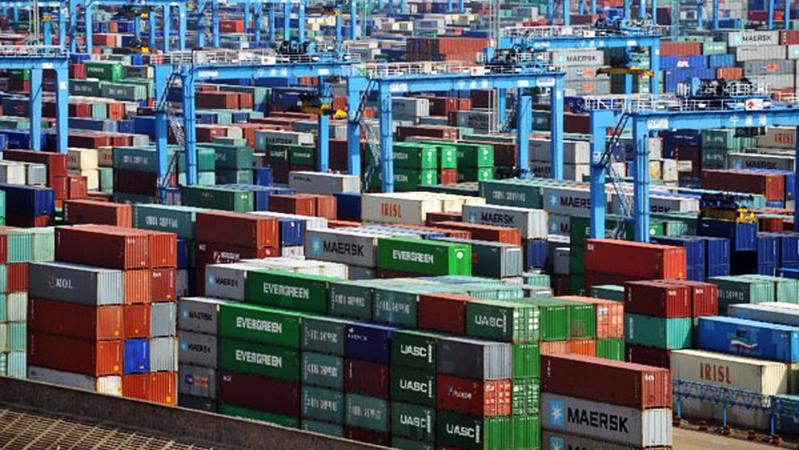Media Report

- Politico reports: "The U.S. trade deficit jumped 8.6 percent in October as imports from China and other suppliers hit a record high ahead of the holiday shopping season, a Commerce Department report released Tuesday showed. The monthly trade gap totaled $48.7 billion, the highest level for a full month since President Donald Trump took office on Jan. 20... Ahead of the election, a Trump campaign adviser asserted they could eliminate the deficit in one or two years. Instead, the 2017 deficit is on track to exceed the 2016 level of $505 billion. Imports of goods and services hit a record high of $244.6 billion as the U.S. economy continued to strengthen and suck in more goods from abroad. Imports totaled $48.2 billion from China, $39.4 billion from the EU and $28.7 billion from Mexico — all record highs... During Trump's recent visit to Beijing, U.S. companies signed contracts valued by the Commerce Department at around $250 billion. But it could be months before any of those transactions are reflected in U.S. trade data."
- The New York Times comments: "In 2018, China will mark the 40th anniversary of its transition from a planned to a market economy. It comes at a unique moment in history: The United States' apparent retreat from globalization offers a distinct opportunity for China to accelerate its ascendance as a guardian of the global trading system. Meanwhile, the nation's rise from poverty to a world power in the last few decades can provide valuable lessons for other developing countries, especially as the Trump administration continues to pursue anti-globalization policies... It is worth noting that after embarking on their own economic transitions, the former Soviet Union and Eastern Europe both suffered economic collapses, while China has seen much more success... In the transition's early years, China had a large number of nonviable state-owned enterprises in capital-intensive industries, such as heavy-equipment manufacturing and steelmaking. In the open and competitive market, such industries could not have survived without protection and subsidies. Therefore the Chinese government subsidized these enterprises, but opened up investment in labor-intensive industries, in which China enjoyed comparative advantages. This dual-track approach allowed China to maintain stability and achieve rapid development... The nation will continue to pursue programs that eliminate poverty and hunger, not only within its own borders but also around the world. Instead of following the Western practice of imposing its values and ideologies on other developing countries as a precondition for humanitarian aid, China will continue to offer aid, trade and investment opportunities to developing countries while adhering to a principle of noninterference."
- Reuters reports: "Top executives at Apple Inc and Facebook Inc managed to find something to praise Beijing for at an internet conference in China this week, even as its Communist Party rulers ban Western social media and stamp on online dissent. China's World Internet Conference attracted the heads of Google and Apple for the first time to hear China vow to open up its internet - just as long as it can guard cyberspace in the same way it guards its borders. The tacit endorsement of the event by top U.S. tech executives comes as China introduces strict new rules on censorship and data storage, causing headaches for foreign tech firms permitted to do business in China and signaling that restrictions banning others are unlikely to be lifted any time soon... China cracks down on any sign of online criticism of the government which it sees as a threat to social stability and one-party rule. Some embassies, business groups and foreign firms steer clear of the highly choreographed internet event, analysts say, because of the perceived propaganda."
Calendar
- 2017-12-04 Apple CEO backs China’s vision of an ‘open’ Internet as censorship reaches new heights
- 2017-12-03 China's Xi says country will not close door to global internet
- 2017-12-01 China sends its top actors and directors back to socialism school
- 2017-11-30 Obama Told Xi He Wants to Help Preserve Ties, State Media Says
- 2017-11-29 China has 'grave concerns' about North Korea's latest missile test
- 2017-11-28 How the U.S. and China Differ on North Korea
- 2017-11-27 What you need to know about Beijing’s crackdown on its “low-end population”
- 2017-11-26 China Industrial Profits Remain Robust With Inflation Intact
- 2017-11-24 A Chinese Kindergarten Is Being Investigated for Sexually Abusing and Drugging Children
- 2017-11-22 U.S. Sanctions 13 Chinese and North Korean Organizations
News
- Politico U.S. trade gap soars as imports from China hit record high
- Reuters Apple, Facebook find something to praise China for amid internet clamp
- Fortune Can China Teach Its Students to Be More Creative?
- CNBC Apple has a 'moral obligation' to push back in China, says senator who probed the company's ties
- Financial Times China plans super-grid for clean power in Asia
- CNBC Canada urgently needs more trade with China, but big hurdles lie in its path
- ABC News Inside China's 'Christmas Village,' where the world's decorations come from
- CNBC Starbucks is opening a store in China every 15 hours
- The New York Times Behind China's Attempt to Ease the Rohingya Crisis
- CNBC North Korea's nuclear ambitions at 'dangerous point,' and could threaten China's market rally, Stephen Roach warns
- Bloomberg Australia Seeks Foreign-Meddling Curbs After China Dust-Up
- The New York Times China Will Lead Electric Car Startup, Ford Chairman Says
- CNBC China is winning 'desperate' global race to control lithium for electric vehicles
Commentary
- The New York Times What China Can Teach Developing Nations About Building Power
- Quartz Chinese manufacturing may not be moving to Africa all that soon
- Bloomberg China's Not Sold on Renting
- NPR Pushing Out Of Migrant Laborers Sparks Controversy In China
- Fortune Why China is Crucial for Airbnb's Global Ambitions
- The Hill America needs to step up the military to keep China at bay
- The Diplomat Is China Ready for a Property Tax?
